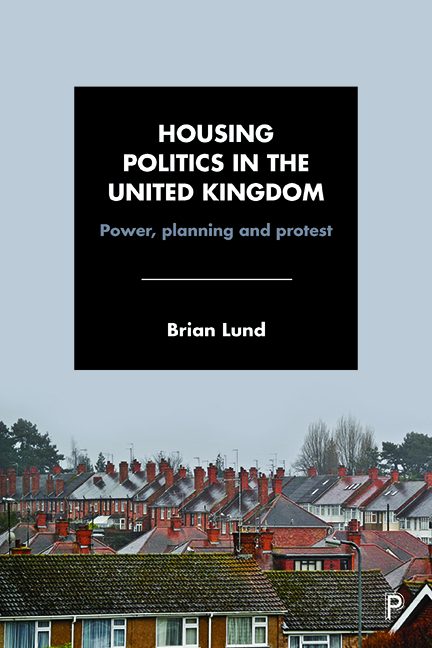Book contents
- Frontmatter
- Contents
- Acknowledgements
- Preface
- one Housing and politics
- two Land politics
- three Urban renewal: fencing the cities
- four Private landlords: ‘Rachmans’ or ‘residential property-owners’?
- five A property-owning democracy?
- six Eclipsing council housing
- seven Bending the ‘Third Arm’: politicians and housing associations
- eight Homelessness politics
- nine Devolution: where is the difference?
- ten Conclusion: power, planning and protest
- References
- Index
ten - Conclusion: power, planning and protest
Published online by Cambridge University Press: 05 April 2022
- Frontmatter
- Contents
- Acknowledgements
- Preface
- one Housing and politics
- two Land politics
- three Urban renewal: fencing the cities
- four Private landlords: ‘Rachmans’ or ‘residential property-owners’?
- five A property-owning democracy?
- six Eclipsing council housing
- seven Bending the ‘Third Arm’: politicians and housing associations
- eight Homelessness politics
- nine Devolution: where is the difference?
- ten Conclusion: power, planning and protest
- References
- Index
Summary
Power
Public choice theorists claim that politicians seek election to obtain personal power, kudos and material advantage. The ‘career politician’ – living off politics rather than for politics (King, 2015) and operating through media spin, focus groups and close attention to the ‘median voter’ in marginal seats – has given this allegation more credibility but it is a calumny when applied to politicians with convictions, such as Aneurin Bevan and Margaret Thatcher. Nevertheless, on franchise extension, all politicians, ideological or pragmatic, had to cultivate popular support to acquire and retain state power.
Housing our masters
Franchise enlargement in the latter part of the 19th century formally incorporated the male householder into the ‘body politic’. The Liberal politician Robert Lowe told the House of Commons: ‘it will be absolutely necessary that you should prevail on our future masters to learn their letters’ (Lowe, 1867). This remark entered educational folklore as ‘we must educate our masters’, and in a wider social reform context, Sydney Webb declared:
If you allow the tramway conductor to vote he will not forever be satisfied with exercising the vote over such matters as the appointment of the Ambassador to Paris … he will seek to obtain some kind of control as a voter over the conditions under which he lives. (Quoted in Gilbert, 1966, p 25)
‘Housing our masters’ became a pressing electoral concern, especially following the widespread agitation on the housing issue in the 1880s. However, although prepared to allow local authorities to construct housing in inner cities on the claim that the market did not function in such areas because workers had to live near their workplaces, both the Liberals and the Conservatives were unwilling to subsidise working-class housing. All the housing initiatives prior to 1919 were circumscribed by a ‘no loss’ requirement, albeit that this condition was overlooked by the ‘Progressives’ when in control of the London County Council.
The electoral impact of the universal franchise awarded in 1918 (women received the vote on equal terms to men in 1928) was tempered between the wars by Labour's need to establish electoral credibility in relation to the Liberal Party and internal Liberal and Labour divisions.
- Type
- Chapter
- Information
- Housing Politics in the United KingdomPower, Planning and Protest, pp. 263 - 288Publisher: Bristol University PressPrint publication year: 2016

